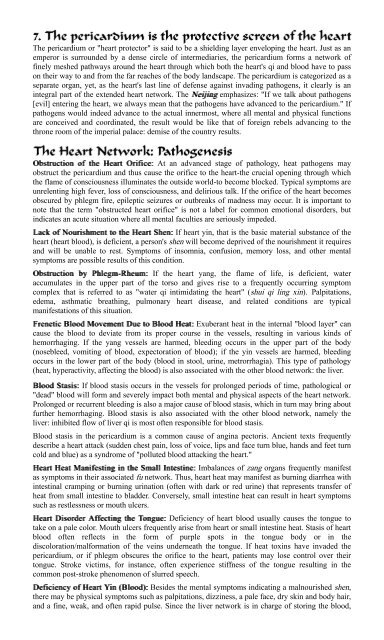You also want an ePaper? Increase the reach of your titles
YUMPU automatically turns print PDFs into web optimized ePapers that Google loves.
The pericardium or "heart protector" is said to be a shielding layer enveloping the heart. Just as an<br />
emperor is surrounded by a dense circle of intermediaries, the pericardium forms a network of<br />
finely meshed pathways around the heart through which both the heart's qi and blood have to pass<br />
on their way to and from the far reaches of the body landscape. The pericardium is categorized as a<br />
separate organ, yet, as the heart's last line of defense against invading pathogens, it clearly is an<br />
integral part of the extended heart network. The Neijing emphasizes: "If we talk about pathogens<br />
[evil] entering the heart, we always mean that the pathogens have advanced to the pericardium." If<br />
pathogens would indeed advance to the actual innermost, where all mental and physical functions<br />
are conceived and coordinated, the result would be like that of foreign rebels advancing to the<br />
throne room of the imperial palace: demise of the country results.<br />
Obstruction of the Heart Orifice: At an advanced stage of pathology, heat pathogens may<br />
obstruct the pericardium and thus cause the orifice to the heart-the crucial opening through which<br />
the flame of consciousness illuminates the outside world-to become blocked. Typical symptoms are<br />
unrelenting high fever, loss of consciousness, and delirious talk. If the orifice of the heart becomes<br />
obscured by phlegm fire, epileptic seizures or outbreaks of madness may occur. It is important to<br />
note that the term "obstructed heart orifice" is not a label for common emotional disorders, but<br />
indicates an acute situation where all mental faculties are seriously impeded.<br />
Lack of Nourishment to the Heart Shen: If heart yin, that is the basic material substance of the<br />
heart (heart blood), is deficient, a person's shen will become deprived of the nourishment it requires<br />
and will be unable to rest. Symptoms of insomnia, confusion, memory loss, and other mental<br />
symptoms are possible results of this condition.<br />
Obstruction by Phlegm-Rheum: If the heart yang, the flame of life, is deficient, water<br />
accumulates in the upper part of the torso and gives rise to a frequently occurring symptom<br />
complex that is referred to as "water qi intimidating the heart" (shui qi ling xin). Palpitations,<br />
edema, asthmatic breathing, pulmonary heart disease, and related conditions are typical<br />
manifestations of this situation.<br />
Frenetic Blood Movement Due to Blood Heat: Exuberant heat in the internal "blood layer" can<br />
cause the blood to deviate from its proper course in the vessels, resulting in various kinds of<br />
hemorrhaging. If the yang vessels are harmed, bleeding occurs in the upper part of the body<br />
(nosebleed, vomiting of blood, expectoration of blood); if the yin vessels are harmed, bleeding<br />
occurs in the lower part of the body (blood in stool, urine, metrorrhagia). This type of pathology<br />
(heat, hyperactivity, affecting the blood) is also associated with the other blood network: the liver.<br />
Blood Stasis: If blood stasis occurs in the vessels for prolonged periods of time, pathological or<br />
"dead" blood will form and severely impact both mental and physical aspects of the heart network.<br />
Prolonged or recurrent bleeding is also a major cause of blood stasis, which in turn may bring about<br />
further hemorrhaging. Blood stasis is also associated with the other blood network, namely the<br />
liver: inhibited flow of liver qi is most often responsible for blood stasis.<br />
Blood stasis in the pericardium is a common cause of angina pectoris. Ancient texts frequently<br />
describe a heart attack (sudden chest pain, loss of voice, lips and face turn blue, hands and feet turn<br />
cold and blue) as a syndrome of "polluted blood attacking the heart."<br />
Heart Heat Manifesting in the Small Intestine: Imbalances of zang organs frequently manifest<br />
as symptoms in their associated fu network. Thus, heart heat may manifest as burning diarrhea with<br />
intestinal cramping or burning urination (often with dark or red urine) that represents transfer of<br />
heat from small intestine to bladder. Conversely, small intestine heat can result in heart symptoms<br />
such as restlessness or mouth ulcers.<br />
Heart Disorder Affecting the Tongue: Deficiency of heart blood usually causes the tongue to<br />
take on a pale color. Mouth ulcers frequently arise from heart or small intestine heat. Stasis of heart<br />
blood often reflects in the form of purple spots in the tongue body or in the<br />
discoloration/malformation of the veins underneath the tongue. If heat toxins have invaded the<br />
pericardium, or if phlegm obscures the orifice to the heart, patients may lose control over their<br />
tongue. Stroke victims, for instance, often experience stiffness of the tongue resulting in the<br />
common post-stroke phenomenon of slurred speech.<br />
Deficiency of Heart Yin (Blood): Besides the mental symptoms indicating a malnourished shen,<br />
there may be physical symptoms such as palpitations, dizziness, a pale face, dry skin and body hair,<br />
and a fine, weak, and often rapid pulse. Since the liver network is in charge of storing the blood,

















